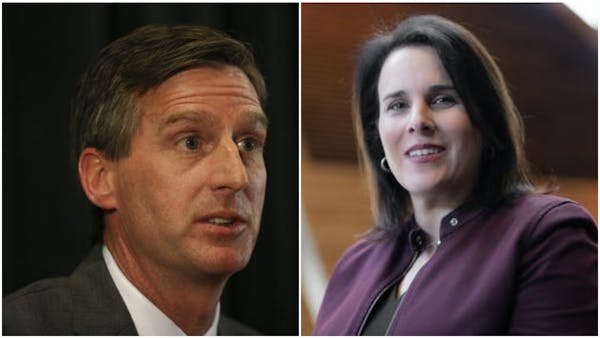TCF Bank Stadium will sit empty this fall. Ditto at Camp Randall Stadium. And Ohio Stadium and 11 others across Big Ten Country, too.
Capping a tumultuous, six-day span, the Big Ten announced Tuesday that it is canceling the fall season in football and all other fall sports because of the coronavirus pandemic. The 180-degree pivot came after the conference gave hope last week by announcing a 10-game, conference-only football schedule.
The next hope for Big Ten football and fall sports such as volleyball, soccer and cross-country will come in the spring, but the conference said that is not guaranteed.
"We just believe collectively there's too much uncertainty at this point in time in our country to encourage our student-athletes to participate in fall sports," Big Ten Commissioner Kevin Warren said on the Big Ten Network.
The decision will be a big financial blow to Big Ten schools. The University of Minnesota estimated last spring that the loss of the fall sports season could cost the athletic department $75 million in revenue.
For both University of Minnesota President Joan Gabel and athletic director Mark Coyle, caution was a guiding principle.
"I go back to March 13 when this all started to pop and the disruption began," Coyle said, referring to the NCAA shutdown of winter sports. "The Big Ten made it very clear: This is about the health and safety of our student-athletes. That was at the forefront of our decisions. That's what we used to follow the conference lead to make the decision we made [Tuesday]."
Added Gabel: "I absolutely support the decision. Safety first. Absolutely safety first."
The Gophers football program, poised to build off an 11-2 season, Outback Bowl victory and top-10 national ranking, now must wait until at least spring to play. Coach P.J. Fleck was not available to comment.
Former Ohio State coach Urban Meyer was skeptical of a spring football season happening.
"No chance," Meyer told BTN. "You can't ask a player to play two seasons in a calendar year. … The body, in my very strong opinion, is not made to play two seasons within a calendar year."
'We don't always agree'
Big Ten presidents began meeting Tuesday morning, and the announcement came at 2 p.m. Warren wouldn't say if the vote to cancel was unanimous, but his response to a question about the vote indicated there was dissent among the 14 members.
"Our schools, we don't always agree, but I think people understand, and I take that from a passion standpoint, that we will be together," Warren said. "I would rather not have a detailed discussion about if the vote was unanimous or not unanimous."
The Pac-12 Conference followed the Big Ten's lead about an hour later Tuesday, announcing it has canceled all sports competition through the 2020 calendar year. This will impact that conference's winter sports, with no games until Jan. 1.
Coyle said talks about the Big Ten winter sports seasons will ramp up soon.
Possible heart issues a factor
What changed in the span of six days for the Big Ten to shut down the season? Warren said it wasn't any one factor, but a developing health situation played a role.
The threat of myocarditis, an inflammation of the heart muscle usually caused by a viral infection, has become a concern of late in college sports because it's been tied to COVID-19. ESPN reported that myocarditis "has been found in at least five Big Ten athletes and several other athletes in other conferences." Myocarditis can lead to heart failure, abnormal heartbeat and sudden death, according to the Mayo Clinic. The viruses that cause the common cold and hepatitis B and C are among those associated with myocarditis.
"For anyone who's been keeping up with the effects of COVID-19 and what it has done and can do or will do to the human body, there has been a lot of discussion about myocarditis," Warren said.
The Pac-12 mentioned serious cardiac side effects of the coronavirus in its decision to cancel fall sports.
Big Red is seeing red
On Monday, a strong pushback from players in the #WeWantToPlay movement and from prominent Big Ten coaches helped stretch the presidents' decision to Tuesday. Nebraska's Scott Frost promised that the Cornhuskers would play a rogue schedule this fall if the Big Ten canceled the season. Ohio State's Ryan Day, whose team is considered a national championship contender, left open the possibility of following Frost's approach.
When asked on BTN if Nebraska or any other conference team could play teams outside of the Big Ten this fall, Warren pointed to the passion in coaches' statements but wouldn't directly answer the question. "These are issues we will address at the appropriate time," he said. "Today is not the appropriate day to do that."
Nebraska athletic director Bill Moos and Frost, plus Chancellor Ronnie Green and University System President Ted Carter, released a statement critical of the Big Ten's decision.
"We are very disappointed in the decision by the Big Ten Conference to postpone the fall football season, as we have been and continue to be ready to play," the statement read. " … We hope it may be possible for our student athletes to have the opportunity to compete."
Wisconsin athletic director Barry Alvarez, during a BTN interview, summed up the disappointment across the Big Ten's 11 states and 14 universities.
"The decision's made, no one likes it, but we're in a pandemic," he said.
The Timberwolves coaching staff, empowered by Finch and energized by chemistry, is a true asset

Trail section at one of Minnesota's most iconic spots closing for rehab

Will 'shotgun only' zone for deer in southern Minnesota be abolished?


